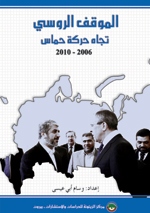This book considers the development of the relations between Russia and Hamas following the latter’s legislative electoral victory in 2006.
The book starts with discussing the backgrounds of the Russian interest in developing this relation, which was according to the book a pillar of a modern Russian approach to “interest-investments” in the Middle East region. The author, Wisam Abi ‘Isa, identifies the determinants of this relation on the side of each party, i.e. Hamas and Russia, then briefs its major stages and moments. He argues that Russia is aiming at a larger regional role in the Middle East, namely towards the Palestinian issue, and thus didn’t consider Hamas Movement a “terrorist” organization, but rather dealt openly with it and appreciated the Movement’s popular support and legitimacy in the Palestinian context.
| Publication Info
Title: The Russian Stance Towards Hamas: 2006-2010. |
 |
The book notes that Russia’s relation with Hamas has peaked with the Russian president’s visit to Damascus and meeting with Khaled Meshaal (the Movement’s head of political bureau) in May 2010. This meeting is considered by the author a sign of recognition of the Movement’s legitimacy on behalf of Russia, and a Russian gesture to the world regarding Hamas’ power that should not be neglected or outdistanced in negotiations to settle the conflict. The movement that sustained four years
The book remarks that throughout its relation with Hamas, Russia has sought to improve its image in the Arab and Muslim worlds, especially after the rupture of this image during the war in Chechnya. The Russian approach was two folds: while it was calling on the international level to lift the siege off Gaza Strip, Russia was pushing Hamas to get convinced with the two state solution and peaceful settlement of the conflict. The Russian dealings in international relations are often of high pragmatism, maintaining good relations with all sides including Israel. The Russian-Israeli relations are advanced namely in trade and military technology fields.
On the other hand –and also according to the book, Hamas sees in developing its relation with Russia some light outside the international political and diplomatic boycott it is subject to, and an opportunity to clear its “terrorism” charge claimed by the United States. The movement has hoped that the Russian stance will encourage some other European countries to get out of the American cocoon, and break the dominant theme of avoiding relations with the Movement.
Finally it should be noted that this book, no matter how brief it appears to be on the pure physical level, it presents invaluable conclusions and concise information that helps in understanding the backgrounds of the Russian stance towards Hamas, and its determinants; along with rich details on the development of this relation throughout the past five years.



Leave A Comment